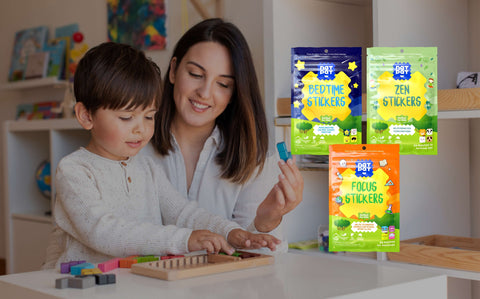Melatonin: the famous sleep supplement. You’ve probably stocked this particular product in your medicine cabinet to get some shut-eye during those long nights when your brain won’t stop buzzing. Melatonin has long been available as a capsule or gummy, but did you know there are also melatonin sleep patches?
These are the new kids on the block for au naturale sleep support.
However, are they the best natural sleep solution? Let’s discuss.
What Is Melatonin?
Before we get into the nitty-gritty details, we have to understand what melatonin is.
A lot of people mistakenly think that melatonin is a vitamin because that’s usually the area of the pharmacy or the supermarket aisle where we find melatonin products.
Actually, melatonin isn’t a vitamin at all—it’s a hormone. This supplement is naturally produced by the body to help us sleep. That’s why it’s referred to as a “supplement.” It supplements extra melatonin on nights when we need some quality shut-eye.
So, why do we take melatonin supplements if our bodies can produce this hormone naturally? There are a whole bunch of reasons you and your family might reach for this natural sleep aid.
Whether you’ve been up with a sick kid or your family’s schedule is preventing you from catching those valuable Zzzs, melatonin can help parents and kids alike fall asleep quickly and stay asleep through the night.
Melatonin and Sleep Cycles
Picture another scenario: your beloved family vacation. You’ve been looking forward to it all year, and it’s finally here, but now your sleep cycle is a jumbled mess. Don’t let time zones ruin the fun. When you’re stuck on a plane overnight or trying to beat jet lag grogginess, the whole family can use melatonin to help adjust your body to sleeping while traveling.
Fun fact: did you know that it takes one day per every hour you jump when traveling through different time zones. For example, if you travel three hours ahead, it will take you three days for your body to get with the new program. Melatonin can help you avoid that adjustment time or make it a little bit smoother.
Melatonin can also be a miracle worker for people battling their natural circadian rhythm. Not everybody works a “normal” shift during the day. Those of us familiar with second or third shifts understand the struggle of trying to sleep when the sun is shining. Melatonin can help you fall asleep while the rest of the world is awake.
Last (but certainly not least), medical conditions and medications can make good sleep an elusive goal. Talk to your doctor or pediatrician about trying melatonin to help aid peaceful sleep for the whole family.
Melatonin: Too Much of a Good Thing?
Melatonin seems great at first glance. However, you can definitely take too much melatonin.
If you take too much melatonin, your body will stop producing this hormone. That’s right—if you take too much melatonin because you can’t sleep, then your body will cease to make this critical hormone, making your sleep even worse.
You can also overdose on melatonin. A melatonin overdose can be dangerous, especially to children who have much smaller bodies than us adults.
Do Melatonin Sleep Patches Work?
The short answer? Yes, but you need to be careful.
Melatonin sleep patches take advantage of the largest organ in your body: your skin. Why do we spend so much time and money protecting our skin from the sun, heat, or cold?
Because it’s a valuable organ and it keeps us healthy? Well, yes, that too. But the skin is also a super useful organ when it comes to absorbing topical supplements like melatonin.
Think of your skin as a special filter. It keeps the good stuff in and the bad stuff out. Villains like germs, bacteria, and dirt can be kept out of our bodies, while heroes like water, blood, and fat stay safe and clean inside beneath its lowest layer.
So, how does melatonin get past our skin’s defense systems? Our bodies naturally produce melatonin, so our skin doesn’t fight to keep out. Instead, the skin absorbs melatonin and allows it to pass into your bloodstream. Next, it’s transported to the brain, where it tells us it’s time to sleep.
Here’s the kicker: children and adults using a sleep patch typically get better sleep than an oral supplement.
Read on to learn why:
How Long Do Melatonin Sleep Patches Last?
You may think an ingested supplement is longer-lasting than something applied to the skin, but guess what? That’s not true here!
Because your body works through melatonin pretty quickly, an oral supplement is absorbed, used, and gone in a flash. If you or your child take an oral supplement before bed, you might wake up in the middle of the night and have trouble falling back to sleep. That melatonin supplement you took is long gone by then.
A lot of people may overuse oral melatonin and wake up the next morning feeling groggy. This is because they’re trying so hard to avoid waking up during the night that it can become super counterproductive—morning fogginess isn’t the ticket if you’re trying to avoid next-day drowsiness.
Melatonin sleep patches provide a slow-release experience because they’re absorbed through the skin. Unlike the stomach, which breaks down oral supplements lightning-fast, sleep patches deliver a continuous small dose of melatonin to our bodies throughout the night.
This means you and your kiddos can fall asleep faster and stay asleep longer. Even if your kids are prone to waking up (or waking you) during the night, these patches can help your family easily fall back asleep.
Unfortunately, oral melatonin supplements typically only have a short half-life of about 40 minutes—AKA, the point where they start to wear off. On the other hand, the sleep patches are designed to provide small doses throughout the night. This way, you and your family can wake feeling rested after sleeping soundly all night long.
SleepyPatch: The Dream Team
If melatonin isn’t your sleep aid of choice, there are tons of other essential oils that can help promote restful sleep.
The Natural Patch Co.’s SleepyPatch provides a blend of sleep-inducing essential oils throughout the night to help you and your kids rest easy and wake up feeling like you can conquer the world.
These sleep-promoting stickers use a blend of mandarin, lavender, sweet marjoram, and vetiver essential oils to help you sleep faster, naturally. Just place one of our SleepyPatch stickers on you or your family’s PJs, and enjoy the benefits of blissful sleep.
Each pack comes with 24 patches in colors your kids will love. Sealed patches can last up to six months, so your family can enjoy deeper and sounder sleep whenever you need it.
These kid-friendly SleepyPatch stickers help your little loved ones fall asleep with no muss or fuss, safe for kids two years old and up. But of course, they’re not just for the kiddos—parents love these patches, too.
Need a little extra help with counting sheep? A common reason people struggle with drifting off to dreamland is anxiety. Try Mood Calming Patches for a dose of essential oils that will bring you the zen you are chasing.
No More Sleepless Nights
Melatonin is a useful hormone supplement that you and your kids can use to get better sleep at night. Sleep patches are scientifically-backed products that can help you stay asleep even longer than oral melatonin supplements.
Explore more about the all-natural SleepyPatch made by The Natural Patch Co. on our website, and check out our blogs to learn more about other topics we think you’ll find pretty important, too.
Sources:
Do Melatonin Sleep Patches Help You Fall Asleep | The Sleep Foundation
Use of Transdermal Melatonin Delivery to Improve Sleep Maintenance During Daytime | NCBI
Melatonin Overdose: How Much Melatonin Should I Take? | Healthline


